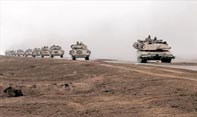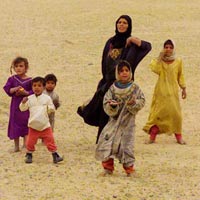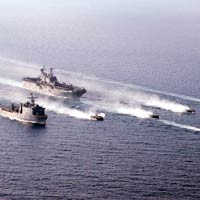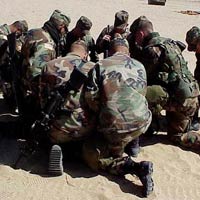- About Us
- Columns
- Letters
- Cartoons
- The Udder Limits
- Archives
- Ezy Reading Archive
- 2024 Cud Archives
- 2023 Cud Archives
- 2022 Cud Archives
- 2021 Cud Archives
- 2020 Cud Archives
- 2015-2019
- 2010-2014
- 2004-2009
 |
150 Issues Of The Cud- December 6, 2004: Evolving Opinions on the War in Iraq |
I have kept a log of my opinions on the War in Iraq and update them from time to time. This version is dated to one day after the recent U.S Presidential elections.
1. The connection between this war in Iraq and specific acts of international aggression, past or prospective, has not been clearly established.
2. Pre'war the media carried a lot of pro'war rhetoric, ambiguous photographs and digital cartoon impressions of allegedly very dangerous vehicles.
3. American and British leaders expressed anxieties about a possible future that was certain to happen; including the rapid deployment of WMDs ' and this anxiety about what might happen was used to bolster intervention.
4. The specific WMD evidence used to justify the war has been shown to lack credibility.
 5. Most pro'war political leaders seem to have given up on the WMD argument but said 'Hey WMDs never really mattered.'
5. Most pro'war political leaders seem to have given up on the WMD argument but said 'Hey WMDs never really mattered.'
6. The failure to guard the high explosives dump seems to be a case of 'Whoops, we forgot about the WD argument while concentrating on the WMD argument.'
7. The possible negative consequences of this war remain to be experienced. I wrote that in Sydney University's Honi Soit in early 2003, but by late 2004 the experience is all too real. They are not confined to individual casualties, military and civilian, but affect the morale, esprit and standing of the countries involved. Negativity is in the rise.
8. Invading Iraq has generated a response of vengeance and fanatical resistance that has no bottom point or constraining measure and has been a recruiter's dream for the anti'western terrorists. Vengeance is a bottomless pit of anger that spreads like a contagion from family to family until it embraces the whole world.
9. Witnessing the President of the USA apologise on television for the misconduct of his nation's soldiers over their inhumanity in the Iraqi prison remains a major negative consequence of the conflict.
10. The image of America as a place and as a people is lower in the world as a result of the war and may slip lower yet. I have a higher suspicion level of the government of the USA than I had before. My suspicion levels remind me of the years of the Vietnam conflict.
 11. Present Australian recourse to the symbol or emblem of ANZAC is a move made in good faith and it is clear that the ANZAC tradition is now claimed in support of this conflict in Iraq ' but this has not been argued for but assumed, and perhaps it is a call on a deposit that is not itself limitless. ANZAC is 'good' so we can use it to make us feel OK about Iraq. I am suspicious of this move and how long it can be sustained.
11. Present Australian recourse to the symbol or emblem of ANZAC is a move made in good faith and it is clear that the ANZAC tradition is now claimed in support of this conflict in Iraq ' but this has not been argued for but assumed, and perhaps it is a call on a deposit that is not itself limitless. ANZAC is 'good' so we can use it to make us feel OK about Iraq. I am suspicious of this move and how long it can be sustained.
12. War entered into before all alternatives have been exhausted makes it unjust. A search of history indicates that unjust wars are hard to find while everyone justifies their particular war as just. When every war is a just war, is every war just a war? It is ironic that we can hardly find any unjust war amongst the entire catalogue.
13. Attack without provocation or warning remains hard to respond to or anticipate. There is a strategic advantage of a sort for terrorists unrestrained by ethics of normality. Terrorists can bleed a society.
14. I do not think that any Australian Prime Minister should be able to take the nation to an overseas war without a clear majority in both houses of Parliament and without a discernible consensus of the people. No major political party campaigned on the war nor made it the election issue ' to their shame. One Mortgage to rule them all!
.
15. I am not convinced that one can impose democracy on a people whose traditions have not developed to that point.
16. War tends to brutalise and corrupt even the just who wage it for a good cause.
17. Is there a serious plan in place if the scheduled Iraqi elections go belly up?
18. The initial air strikes against Saddam Hussein were described in most media as 'decapitation strikes'. In hindsight this remains a disastrous misuse of the English language, and a gross provocation to literal responses.
 19. It is not obvious to me, as a mere person in the street, how the capture of Saddam and his 'pack of cards' has made the slightest difference to anything, and in fact, the conflict simply seems to spiral into worse atrocities and chaos on a daily basis.
19. It is not obvious to me, as a mere person in the street, how the capture of Saddam and his 'pack of cards' has made the slightest difference to anything, and in fact, the conflict simply seems to spiral into worse atrocities and chaos on a daily basis.
20. Does John Kerry have a viable exit plan? Also ' for himself?
21. In terms of measurable outcomes, it is possible to regret the war option on the grounds that it has made things worse than they otherwise would have been and may yet 'cost the earth' as a flawed strategy engaged in by men who should have known of better alternatives.
Ivan Head is the Warden of St Paul's College in the University of Sydney.
images courtesy of Geek Philosopher
